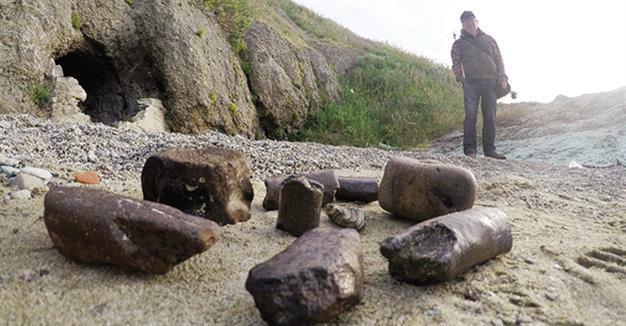Hobby objects turn out to be fossils in Turkey's northwest
ISTANBUL – Anadolu Agency

Objects collected by a local in the northwestern province of Çanakkale’s Gelibolu district have turned out to be the fossils of animals that lived millions of years ago, according to university officials.
“Examinations revealed that the objects are the fossils of an 8 million- to 10 million-year-old whale species. And some of them are the fossils of other animals. They are dolphin species, bisons, horses, starfish, sea urchins and others,” said İsmail Gürlen, a health technician.
Gürlen said he had started collecting interesting stones and other objects in 2011. Thinking that they could be fossils, Gürlen said he contacted the paleontology departments of Ege University and Çanakkale 18 Mart University (ÇOMÜ) for clarification.
Gürlen said the number of fossil samples had increased every other day. “When the number of the fossils reached 1,800, I got very excited about further examinations. It is not possible to see so many fossil beds just anywhere. I have been searching many spots. Gelibolu is a paradise for fossils. This is a hobby for me, not an income channel.”
Most of the fossils Gürlen collected are on display at ÇOMÜ’s History of Nature Museum.
‘Not easy to find whale fossils’
Ege University History of Nature Museum Director Professor Tanju Kaya said the founder of the museum, Professor Fikret Ozansoy, had registered the whale and dolphin fossils in the Çanakkale region in the 1950s.
“His objects have been on display in our museum for 50 years. But we had not received any findings for the last 30 years. Then Gürlen alerted us about the fossils in this region. He has given most of his findings to the museum at ÇOMÜ. We examined the area and found whale fossils, which are very hard to find in Turkey. It is very important scientifically. Then we started collaborating with the ÇOMÜ Museum. When the work is done, all fossils will be displayed there,” Kaya said.
Stating that they had many whale fossils, Kaya said: “We know that they are from the Miocene epoch, which was between 5 million and 30 million years ago. Gürlen recently found the fossil of a dolphin chin. This is the first known dolphin fossil in Gelibolu. Anatolia does not have whale and dolphin fossils. There are fossil beds on the Gelibolu coastline. They are driven to the surface by waves and undercurrents.”
 Objects collected by a local in the northwestern province of Çanakkale’s Gelibolu district have turned out to be the fossils of animals that lived millions of years ago, according to university officials.
Objects collected by a local in the northwestern province of Çanakkale’s Gelibolu district have turned out to be the fossils of animals that lived millions of years ago, according to university officials.